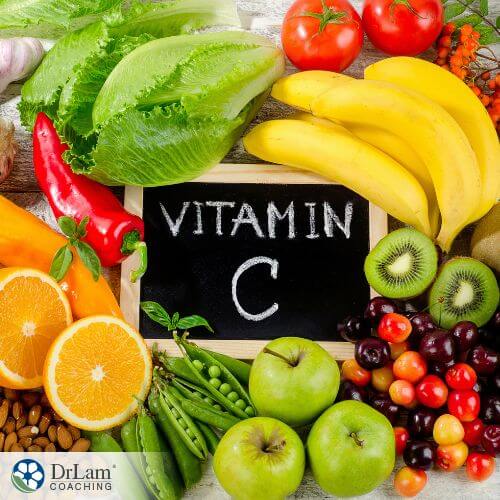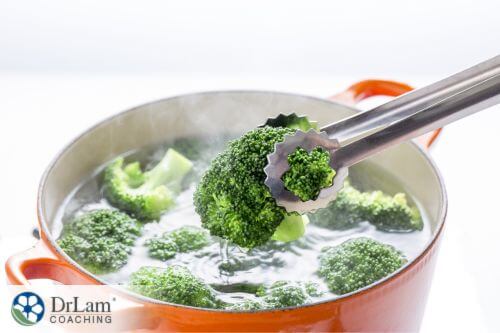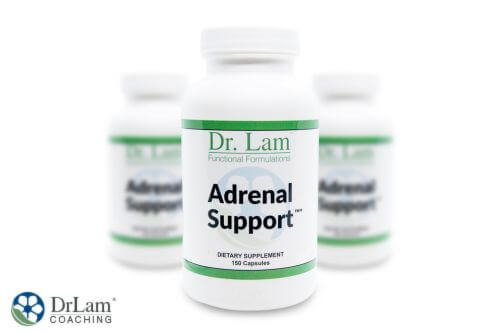 Vitamin C is probably one of the most well-known vitamins, especially in the winter season when colds and flu hit. Its popularity started in the 1970s when a Nobel prize winner, Linus Pauling started to promote the use of this vitamin to prevent colds and flu. Nowadays many reach for orange juice or a supplement when a cold or flu begins.
Vitamin C is probably one of the most well-known vitamins, especially in the winter season when colds and flu hit. Its popularity started in the 1970s when a Nobel prize winner, Linus Pauling started to promote the use of this vitamin to prevent colds and flu. Nowadays many reach for orange juice or a supplement when a cold or flu begins.
Whilst prevention of colds and flu is one use, this vitamin has many other roles in the body that are equally or more important. This article will explore vitamin C and its multiple benefits.
Also known as ascorbic acid, vitamin C is one of the water-soluble vitamins that your body relies on from food sources. Since it is a water-soluble vitamin, it can dissolve in water and can travel throughout your body through the blood to where it is needed. It also means that, due to its nature, it cannot be stored in the body and is excreted through the urine when consumed in excess.
Humans cannot make vitamin C and need to rely on dietary sources. The daily recommendations are:
This recommendation increases in pregnancy to 85mg, in breastfeeding to 120mg, and in the case of smokers, the recommendations increase by 35mg.
The earliest record of a vitamin C deficiency was with sailors due to the lack of fresh fruits and vegetables on ships at sea. These sailors developed a condition called scurvy, a condition that involves bleeding and inflamed gums and can result in loose and lost teeth.
Whilst this is a well-known symptom of a vitamin C deficiency, there are other symptoms of this deficiency that include:
Individuals today who are at risk for this deficiency are:
One of the most well-known benefits of vitamin C is its use in colds and flu. It does not prevent or fix colds and flu, but it does shorten the length of the illness, and individuals who were supplemented with vitamin C whilst sick did experience milder symptoms compared to individuals who did not supplement. It is important to note here that the individuals who took this supplement started taking it before getting sick (1).
Not only is vitamin C a vitamin, but it also acts as an antioxidant. In response to stress, toxins, and illness, your body produces free radicals, unstable molecules that can damage your cells, resulting in cell death and an increase in inflammation. This can accelerate aging as well as increase the risk of complications in individuals who are experiencing medical conditions.
Antioxidants help to neutralize these free radicals, preventing further damage to your cells and reducing inflammation. Vitamin C is one of these antioxidants and these antioxidant properties help explain how it plays many so important roles in the body.
 Vitamin C is necessary for the synthesis of collagen, an essential protein in the skin that helps to prevent wrinkles. With its antioxidant properties, it can also help to enhance wound healing, protect the skin from sun damage, and can decrease sun damage in the skin.
Vitamin C is necessary for the synthesis of collagen, an essential protein in the skin that helps to prevent wrinkles. With its antioxidant properties, it can also help to enhance wound healing, protect the skin from sun damage, and can decrease sun damage in the skin.
Vitamin C helps to enhance heart health by reducing inflammation and lessening the deposit of fat in the arteries. This helps to reduce the risk of a stroke (2).
Another less-known benefit of taking vitamin C is that it can enhance the absorption of other nutrients such as iron, zinc, and calcium. This is why many iron, zinc, and calcium supplements contain vitamin C.
If you are currently experiencing low levels of these nutrients, consuming dietary sources of these nutrients along with sources of vitamin C can improve absorption.
Vitamin C has been found to help neutralize toxins that enter the body. These toxins include:
With its ability to neutralize toxins within the body, vitamin C is regarded as the ultimate antitoxin, and to date, literature hasn't found a toxin that cannot be neutralized with this antioxidant.
In response to stress, your body releases cortisol, one of the main stress hormones. Cortisol helps your body handle the stress that it is currently experiencing. Whilst cortisol can be beneficial for your body in helping it to adapt to stress, if your body is exposed to cortisol for a long period of time it can result in negative health effects such as weight gain and sleep disturbances. After time, your adrenal glands can become depleted and cortisol levels become low, resulting in Adrenal Fatigue Syndrome (AFS).
The relationship between cortisol and vitamin C is a synergistic one. Your adrenal glands are responsible for the production of cortisol and require it in order to produce cortisol. Because of this, there is a high concentration of vitamin C in your adrenal glands. When your body experiences stress, your requirements for vitamin C increase. Additionally, it helps to preserve your immune system and protect your body from damage from free radicals. This helps to prevent further stress on the body. Studies have also found that vitamin C can help to lower levels of cortisol in the body, helping your body to calm down after stress (3).
On the other end of the spectrum, cortisol promotes the cellular uptake of vitamin C outside the cells. Without sufficient cortisol, it cannot be transported into cells, and the risk of oxidative damage and inflammation increases. Studies have also shown that sufficient cortisol reduces the risk of infection, perhaps related to its relationship with vitamin C. The amount that is able to be transported into the cells depends on the amount of vitamin C ingested.
The most well-known food source of vitamin C is oranges. However, it is abundant in many other food sources.
The top five dietary sources are:
 Whilst there are many fruits and vegetables rich in this vitamin, it is important to remember that this vitamin is a water-soluble vitamin. This makes it vulnerable to cooking methods such as boiling and can be lost if you boil the food for a long period of time. If you do boil vegetables, you can boil them until they are just cooked, or use the water that was boiling the vegetables as an ingredient in a soup or sauce. In contrast, cooking methods such as steaming, baking, and roasting retain the water-soluble vitamins.
Whilst there are many fruits and vegetables rich in this vitamin, it is important to remember that this vitamin is a water-soluble vitamin. This makes it vulnerable to cooking methods such as boiling and can be lost if you boil the food for a long period of time. If you do boil vegetables, you can boil them until they are just cooked, or use the water that was boiling the vegetables as an ingredient in a soup or sauce. In contrast, cooking methods such as steaming, baking, and roasting retain the water-soluble vitamins.
It is possible to meet the recommended intakes through dietary sources alone if you consume a varied diet. However, if you are looking to boost your antioxidant levels or improve your skin health, a supplement may be necessary and can help provide a higher amount of vitamin C to your body.
Vitamin C is a common supplement, especially during winter, and is available in tablet, capsule, liquid, effervescent, and even IV forms. The amount in a supplement will depend on the brand and may contain additional nutrients such as zinc and calcium due to their beneficial relationship.
There are different forms of vitamin C. The most common form is ascorbic acid as it's similar to the ascorbic acid found naturally in foods. However, other forms include:
Some supplements will also contain a combination of different forms. Studies have found that a combination form can produce a higher concentration. However, due to the low cost and availability of ascorbic acid, it is the preferred form (4).
The different forms will have slightly different characteristics. Sodium and calcium ascorbate for example have a better absorption compared to ascorbic acid. Ascorbyl palmitate is retained in the body longer than ascorbic acid. Bioflavonoids are natural sources that have an increased bioavailability, this allows your body to receive more vitamin C.
There are many different brands of supplements, and choosing one can seem like a difficult task. Let's explore four different vitamin C supplements that are on the market and how they work.
This supplement is in a liquid form with the recommended serving size being one teaspoon and is in a liposomal form. This liposomal form means that vitamin C has a coat of lipids around it. Lipids are not soluble in water and need to be absorbed by fat. This reduces the risk of it being lost before it can reach the intestine and improves absorption in the body.
LipoNano C uses a combination of ascorbic acid and sodium ascorbate, as well as a blend of lecithin, shitake mushrooms, and lion mane mushrooms. Lecithin helps to improve heart health, whilst the shitake and lion's mane mushrooms help to reduce inflammation, improve the immune system, and support mental health. The dose of vitamin C in this supplement is 1200mg.
This supplement contains a range of different forms of vitamin C such as calcium ascorbate, magnesium ascorbate, ascorbic acid, and ascorbyl palmitate along with amino acids. The different forms help to boost calcium and magnesium levels as well as improve absorption. This enhances the benefits the supplement can provide. Adrenal Stress Control provides 800mg of vitamin C as well as a blend of additional amino acids that can support the production of collagen and reduce the risk of heart disease by lowering lipoprotein- a marker of heart disease. This supplement is in a powder form, with quick absorption it can increase energy quickly, and the recommended serving size is one to two level scoops with six ounces of water daily.
 Containing four different forms of vitamin C, Adrenal Support provides 300mg. The forms that it uses are ascorbyl palmitate, calcium ascorbate, and magnesium ascorbate as well as an extract from citrus fruits. This supplement is in capsule form, and the recommended dosage is one to two capsules per day. It's a much gentler vitamin C supplement for those who struggle with sensitivities. It is also fat soluble, so the utilization and absorption is much slower and better for adrenal fatigue sufferers who are very sensitive to supplements.
Containing four different forms of vitamin C, Adrenal Support provides 300mg. The forms that it uses are ascorbyl palmitate, calcium ascorbate, and magnesium ascorbate as well as an extract from citrus fruits. This supplement is in capsule form, and the recommended dosage is one to two capsules per day. It's a much gentler vitamin C supplement for those who struggle with sensitivities. It is also fat soluble, so the utilization and absorption is much slower and better for adrenal fatigue sufferers who are very sensitive to supplements.
With its water-soluble properties, the risk of vitamin C toxicity is minimal. There is no established dose at which it is toxic, but the upper recommended limit is 2000mg. Doses larger than this may cause:
Large doses may also increase the risk of kidney stones. However, in studies with doses as much as 250g daily, there were no reported kidney stones or other side effects experienced.
As previously mentioned, AFS is a condition resulting from chronic stress. In addition to your adrenal glands releasing cortisol, the NeuroEndoMetabolic (NEM) Stress Response System helps to support your body and helps to manage stress. Symptoms of AFS will depend on where in the NEM system the imbalance is occurring.
There are six different circuits of related organs and systems within the NEM system; one of these circuits is the detoxification circuit which is responsible for removing waste products and toxins from your body. The parts of the body responsible for this circuit are the liver, immune system, and the interstitium. An imbalance within this circuit will result in your body being unable to effectively remove toxins and waste products. Vitamin C can play an important role in this circuit by helping to neutralize toxins and prevent further damage to your body. It can also help to support your immune system.
Another circuit in which vitamin C plays an important role is the Hormone circuit. This circuit is responsible for the signaling of your hormones and consists of your adrenal glands, thyroid glands, and reproductive organs. It can help to support your adrenal glands, helping to regulate cortisol levels, and can help to protect your adrenal glands from free radical damage.
 Vitamin C can help to support your body during AFS and other health challenges. However, be sure to chat with your healthcare provider first. AFS, especially an imbalance in the detoxification system, can cause your body to become more sensitive to chemicals and foods. This can cause your body to react to any new sources of vitamin C that are introduced into the diet as well as supplements. This can set you back in your journey to recovery.
Vitamin C can help to support your body during AFS and other health challenges. However, be sure to chat with your healthcare provider first. AFS, especially an imbalance in the detoxification system, can cause your body to become more sensitive to chemicals and foods. This can cause your body to react to any new sources of vitamin C that are introduced into the diet as well as supplements. This can set you back in your journey to recovery.
If you are in an advanced stage of AFS, your body may also not react to the vitamin C as it would without AFS and may react negatively, setting you back in recovery. If you are concerned that you may be experiencing AFS or have AFS and would like to see if vitamin C can benefit you, chat with your healthcare provider first for guidance and a plan that will support your body.
Vitamin C is a nutrient that is found in many fruits and vegetables and has multiple important roles in the body that include:
Whilst dietary sources can help to meet your recommended daily amount of vitamin C, supplemental forms can help to provide a higher dose that can provide multiple benefits including supporting your body in the stress response. However, be sure to talk to your doctor before taking any new supplements.
If you are considering the use of vitamin C in helping to manage stress or inflammation in your body, you can call the Dr. Lam team at +1 (626) 571-1234 or click here for a free initial consultation.
InformedHealth.Org. "Common Colds: Does Vitamin C Keep You Healthy?" Updated Oct. 2020. https://www.ncbi.nlm.nih.gov/books/NBK279544/
Tang X, et al. "Vitamin C Intake and Ischemic Stroke." Front Nutr., vol. 9, Jul. 2022. https://www.ncbi.nlm.nih.gov/pmc/articles/PMC9330473/
Marik P. "Vitamin C: an Essential 'Stress Hormone' During Sepsis." J Thorac Dis., vol. 12, no. 1, Feb. 2020, pp. 84-8. https://www.ncbi.nlm.nih.gov/pmc/articles/PMC7024758/
National Institutes of Health. "Vitamin C" Updated March 2021. https://ods.od.nih.gov/factsheets/VitaminC-HealthProfessional/
Prakash A, Baskaran R. "Acerola, an Untapped Functional Superfruit: a Review on Latest Frontiers." J Food Sci Technol., vol. 55, no. 9, Sep. 2018, pp. 3373-84. https://www.ncbi.nlm.nih.gov/pmc/articles/PMC6098779/
It can be tricky choosing a form of vitamin C. Ascorbic acid is the most common form in supplements. However, other forms such as liposomal, bioflavonoid extracts, or supplements that offer a combination of vitamin C forms will offer better absorption as well as the addition of other nutrients.